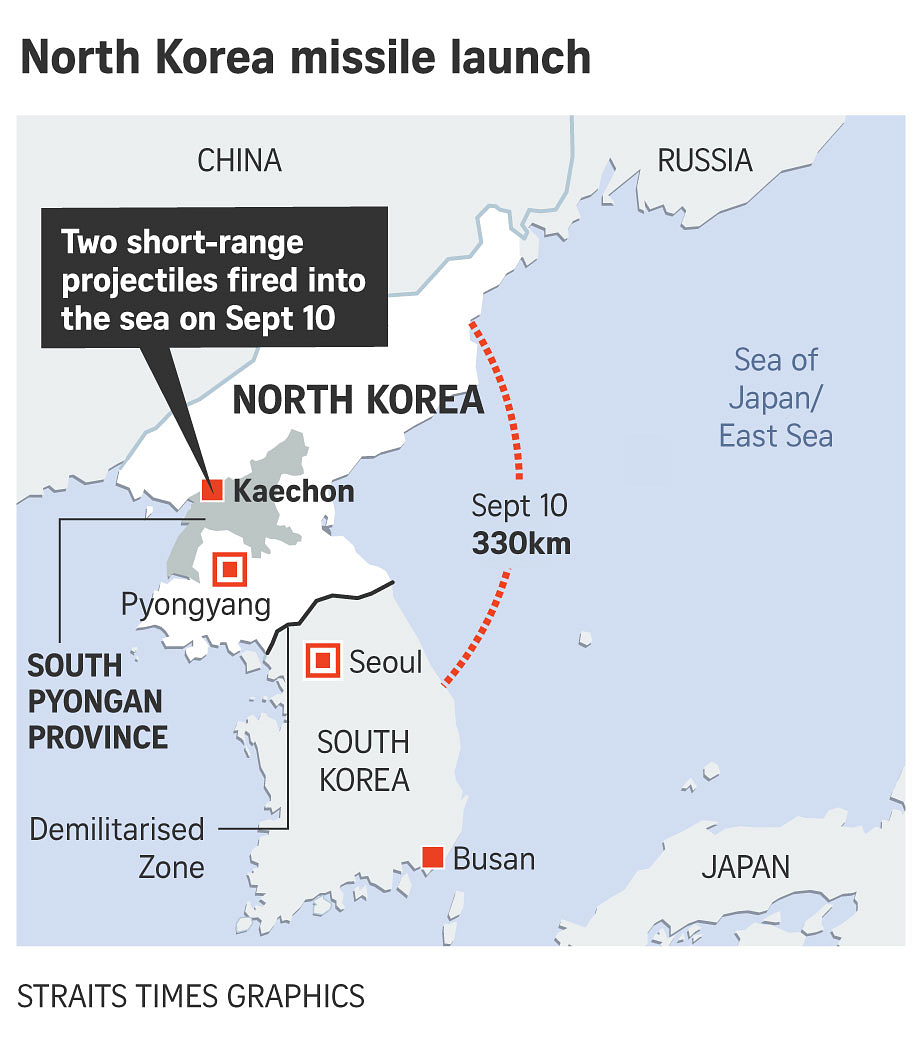North Korea fires two projectiles after offering talks with US
Sign up now: Get insights on Asia's fast-moving developments
Follow topic:
SEOUL (AP, REUTERS) - North Korea launched at least two unidentified projectiles towards the sea on Tuesday (Sept 10), South Korea's military said, hours after the North offered to resume nuclear diplomacy with the United States but warned its dealings with Washington may end without new US proposals.
The North's projectile launches and demand for new proposals were apparently aimed at pressuring the United States to make concessions when the North Korea-US talks restart.
North Korea is widely believed to want the United States to provide it with security guarantees and extensive relief from US-led sanctions in return for limited denuclearisation steps.
The North Korean projectiles fired from its South Pyongan province, which surrounds its capital city of Pyongyang, flew across the country and in the direction of the waters off its east coast, according to South Korea's Joint Chiefs of Staff (JCS) and Defence Ministry.
The "short-range projectiles" were launched from around Kaechon in South Pyongan province at around 7am KST (2200 GMT Monday) towards the east and flew about 330km, the JCS said in a statement.
The military said South Korea will monitor possible additional launches by North Korea but gave no further details such as the type of projectile North Korea fired.
On Monday night, the North's first vice-foreign minister, Choe Son Hui, said North Korea is willing to resume nuclear diplomacy with the United States in late September but that Washington must come to the negotiating table with acceptable new proposals.
She said if the proposals don't satisfy North Korea, dealings between the two countries may come to an end.
Tuesday's launch is the eighth by North Korea since US President Donald Trump and North Korean leader Kim Jong Un met at the heavily militarised border between the two Koreas in June.
Trump and Kim agreed then to restart working-level negotiations for denuclearisation talks that had stalled since an unsuccessful second summit between Trump and Kim in Hanoi in February.

A senior Trump administration said: "We are aware of reports of projectiles launched from North Korea. We are continuing to monitor the situation and consulting closely with our allies in the region."
Another US official, speaking on the condition of anonymity, said initial information indicated North Korea had launched two projectiles that appeared to be short range.
A Japanese defence ministry official said there was no confirmation of any ballistic missile entering the country's territory or exclusive economic zone, adding there was no immediate threat to its national security.
South Korea's presidential office said national security adviser Chung Eui-yong presided over an emergency National Security Council meeting where officials expressed "strong concern" over the continuing short-range launches by the North.
The US special representative for North Korea, Stephen Biegun, spoke by telephone with his South Korean counterpart, Lee Do-hoon, on Tuesday morning, South Korea's foreign ministry said in a statement.
Biegun has led working-level talks with North Korea. He discussed with Lee how to make substantive progress on denuclearisation and peace, according to the ministry, which did not mention Choe's comments or the latest launches.
North Korea has previously said its development of new weapons is to counter military threats and offensive pressures against its own security.
However, analysts say the string of launches highlight how North Korea has been able to further develop its military capabilities in the absence of any concrete agreement with the United States.
Many of the latest missiles launched by North Korea appear to be new types designed to evade interception by US, South Korean and Japanese missile defence systems.

